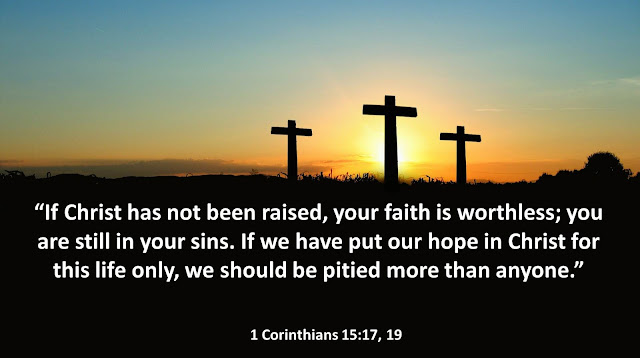Introduction
"In God We Trust" has increasingly become a debated motto for Americans as the country becomes more secularized. However, in recent days, the State of South Dakota passed a law stating that all public schools must prominently display that motto on their campuses. Many will challenge the constitutionality and wisdom of such a law while others will debate the practicality of it (such as money to fund the creation of the displays). Neither of those is the focus of this post, though. Today, I want to discuss the reasonableness of an educational institution recognizing God's existence and its dependence on Him.
Many things that the educational system depends upon actually requires God to find its roots in reality. It is quite common for the distinction between knowing something and justifying something to be confused. We can know that something is true without being able to justify its being true. In philosophy, this is known as the distinction between ontology (what is true) and epistemology (how we know what is true). People can know things to be true, and even act properly according to that knowledge, yet not hold a worldview that can justify its being true (this will be explained more, in the section on morality below). Many of the things that are foundational to education (e.g. knowledge, progress, intrinsic human value, diversity, design, history, and science) are often known yet cannot be justified by those who know them to be true. Of those many things, knowledge is the most foundational.
Knowledge, The Education System, and God
Knowledge is at the foundation of the entire education system. If we cannot find some way to ground our claims of knowledge to reality, we are merely communicating opinions. Because of this, if knowledge of reality is not even possible, then all knowledge disciplines (the subjects taught in school), are not rightly called "knowledge" but rather "opinion" disciplines. The connection of knowledge to God is required in two ways: first, the justification of what is true must be something that is chiefly concerned with what is true. Second, the agents who are attempting to discover what is true must possess faculties that are concerned with chiefly with what is true.
We know from evolutionary biology that organisms and all their components are only "concerned" with survival (I place quotes around "concerned" because naturalistic evolution is neither forward-thinking nor purpose-driven). This means that our brains are not programmed by nature to believe what is true but rather to believe what will keep us alive. In a world that is "red in tooth and claw" it is better to be safe than sorry, so our brains register (believe) many false positives about dangers, for instance. This is just one example of "useful fictions" that our brains must believe, according to naturalistic evolution. Because they are chiefly concerned with believing what will keep us safe even if it is false, our brains are not reliable tools for apprehending truth.
However, if our brains are created by a God who is concerned with our ability to believe what is true, then He would have created our brains (and sense organs, as well) with the ability to not only distinguish between what is true and what is safe, but it will also prefer the former (free will does have an effect on this, though). So, from the very foundation of the educational system, for it to even be called such, God is required. On this ground, alone, it is reasonable that an education system would recognize God's existence and its dependence upon Him for its very purpose in society (to educate).
Without proper justification, there is no objective standard by which to judge what is true or false about not just knowledge, but the things that we will continue to discuss in this post, and what is taught by the system about these things comes at the whim of whoever is currently controlling the system. The education system ultimately reduces to "might makes right," an exercise in epistemology anarchy. If the education system were to affirm any worldview that cannot justify knowledge, it is admitting its uselessness for imparting knowledge to the next generation and admitting that its only purpose is to propagandize our children into blindly believing that their purpose in life is to serve an elite class of people with money and power.
Without proper justification, there is no objective standard by which to judge what is true or false about not just knowledge, but the things that we will continue to discuss in this post, and what is taught by the system about these things comes at the whim of whoever is currently controlling the system. The education system ultimately reduces to "might makes right," an exercise in epistemology anarchy. If the education system were to affirm any worldview that cannot justify knowledge, it is admitting its uselessness for imparting knowledge to the next generation and admitting that its only purpose is to propagandize our children into blindly believing that their purpose in life is to serve an elite class of people with money and power.
For more on the necessity of God to justify knowledge, I highly recommend that you read the book "Where The Conflict Really Lies: Science, Religion, and Naturalism" by philosopher Alvin Plantinga. Also, see this short video explaining his argument:
Conclusion
It is only if God exists that what we believe can be justified. Without God, all claims to knowledge are merely opinions and do not actually reflect reality. If they do not actually reflect reality, then the "education" system is not imparting knowledge of what is true but rather indoctrinating opinions that are preferred by a few people in power. Since the public school system claims to impart knowledge of the world in which we live, it is only reasonable that our schools recognize the foundation and justification of knowledge: God. Students and parents are free to disagree; however, if they wish to do so, they need to defend an alternative justification.
For more on this topic and to see how several other foundations to the education system are justified only by God's existence, see the links throughout this post and these additional ones:
For more on this topic and to see how several other foundations to the education system are justified only by God's existence, see the links throughout this post and these additional ones:
- Is Education Overrated?
- The Magna Carta of Humanity
- Legislating Morality: Is It Wise, Is It Legal, Is It Possible
- Would Jesus Participate In Politics?
- 6 Ways Atheism Is A Science-Stopper
- The Word of God and the Mind of Man
- Why Is The Image of God So Important?
- Agents Under Fire
- The Bible Among The Myths
- How Naturalism Defeats Science As A Knowledge Discipline
- 12 Things Your Professors Won't Tell You About God and Science
- Apple CEO Tim Cook On Ethics and Purpose In Technology
- Without God, Do We All "Bleed The Same"?



![Quote from J. Warner Wallace from the book "Cold Case Christianity": "In a culture where image is more important than information, style more important than substance it is not enough to possess the truth. [Christian] case makers must also master the media." Quote from J. Warner Wallace from the book "Cold Case Christianity": "In a culture where image is more important than information, style more important than substance it is not enough to possess the truth. [Christian] case makers must also master the media."](https://blogger.googleusercontent.com/img/b/R29vZ2xl/AVvXsEgjzd-AVrSD639EhMmzxkuF0Bnljb5HsU8EWUMxinozxX8bH24FyQLgLy-zoOIdrbNroHsxUB7vC6hCq-vrGBScsrOGBo6BrVP-b4kmjQyzP0oIxprR-9KJ17qB4ESr-AwcC7ZZz7cMbPk/s640/Slide7.JPG)


![Quote from "Come Let Us Reason" by Norman Geisler: "[Special pleading] is [a] way to make certain the opposing view doesn't get a fair shake. Here only the evidence that supports one view is cited, and the rest is left out...If there are ten studies that show your view to be false, ignore them and make a big point about the one that confirms your conclusion. Really, this argument counts on the listener to be ignorant of the facts. That way anything can be claimed, and no objection can be raised. However, if someone knows about the other ten studies, you're in trouble. This kind of argument can be torn apart easily if all the facts are made known." #Logic #Fallacy #SpecialPleading #Philosophy #Reason Quote from "Come Let Us Reason" by Norman Geisler: "[Special pleading] is [a] way to make certain the opposing view doesn't get a fair shake. Here only the evidence that supports one view is cited, and the rest is left out...If there are ten studies that show your view to be false, ignore them and make a big point about the one that confirms your conclusion. Really, this argument counts on the listener to be ignorant of the facts. That way anything can be claimed, and no objection can be raised. However, if someone knows about the other ten studies, you're in trouble. This kind of argument can be torn apart easily if all the facts are made known." #Logic #Fallacy #SpecialPleading #Philosophy #Reason](https://blogger.googleusercontent.com/img/b/R29vZ2xl/AVvXsEjqjNyDPE3Q3H2-32IpuOxEDs2UTMMc-AMqNDZtwENCjZ4nojFWFPf0X4L-yZmnT5JTNggeJIXpb_HjvOhNe_tDgJ6z8TMAy2-zzSjy1rSxD82jsPpQYCCjvt2m2_soE5jLvCFfVM2nVOQ/s640/Slide13.JPG)
















